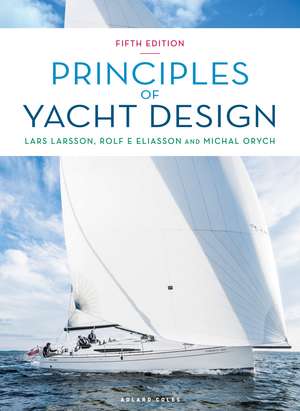Principles of Yacht Design
Autor Lars Larsson, Rolf Eliasson, Michal Orychen Limba Engleză Hardback – 16 mar 2022
Preț: 340.04 lei
Preț vechi: 546.78 lei
-38% Nou
Puncte Express: 510
Preț estimativ în valută:
65.07€ • 68.11$ • 54.16£
65.07€ • 68.11$ • 54.16£
Carte disponibilă
Livrare economică 10-24 martie
Livrare express 21-27 februarie pentru 166.30 lei
Preluare comenzi: 021 569.72.76
Specificații
ISBN-13: 9781472981929
ISBN-10: 1472981928
Pagini: 400
Ilustrații: diagrams and tables throughout
Dimensiuni: 192 x 264 x 28 mm
Greutate: 1.38 kg
Ediția:5
Editura: Bloomsbury Publishing
Colecția Adlard Coles
Locul publicării:London, United Kingdom
ISBN-10: 1472981928
Pagini: 400
Ilustrații: diagrams and tables throughout
Dimensiuni: 192 x 264 x 28 mm
Greutate: 1.38 kg
Ediția:5
Editura: Bloomsbury Publishing
Colecția Adlard Coles
Locul publicării:London, United Kingdom
Caracteristici
Fifth edition revised and expanded to reflect updated standards and to include photos of the building process of the new 41ft performance cruiser
Notă biografică
Lars Larsson is a naval architect and Professor of Hydrodynamics at Chalmers University in Gothenberg, Sweden. Michal Orych is a naval architect and CFD specialist at FLOWTECH International. Rolf Eliasson is a yacht design/construction engineer who runs his own yacht design and production company.
Cuprins
PREFACE TO THE FIFTH EDITION LIST OF SYMBOLS INTRODUCTION 1 DESIGN METHODOLOGY The design spiral Computer-aided design (CAD) 2 PRELIMINARY CONSIDERATIONS Choice of boat-type Intended use Main dimensions Cost Checklist of considerations Checklist for the YD-41 3 HULL GEOMETRY DefinitionsLines drawing Tools Work plan Computer-aided design of hulls 4 HYDROSTATICS AND STABILITY Calculation of areas Wetted surface DisplacementCentre of buoyancy Water plane area Transverse and longitudinal stability at small angles Transverse stability at large angles of heel Curve of static stability RollingInfluence of waves on the righting moment Stability statistics Assessment of seaworthiness 5 HULL DESIGN Forces and moments on a sailing yacht Resistance components Viscous resistance: basic concepts Frictional resistance Viscous pressure resistance RoughnessWave resistance: basic concepts Wave and residuary resistance Heel resistance Added resistance in waves Other seakeeping aspects Hull statistics 6 KEEL AND RUDDER DESIGN Flow around a wing Definition of the keel planform Classical wing theory Tip shape Lift and induced resistance of the yacht Advanced planform design Canting keels Evaluation of some planform concepts Definition of the section Three useful NACA sections Influence of shape on section characteristics Some practical conclusions regarding section shape Influence of deviations from the theoretical section shape Advanced section design Statistics on keel and rudder area The YD-41 7 SAIL AND RIG DESIGN Flow around sails PlanformSail camber Mast interference Means for reducing mast disturbances StreamliningA practical model for sail and rig aerodynamics Sail statistics 8 BALANCE Effect of heel Good balance Centre of effort of the underwater body Centre of effort of the sails Lead Rudder balance 9 PROPELLER AND ENGINE Resistance in calm and rough weather Propeller characteristics Design of an optimum propeller Performance of the non-optimum propeller Check of blade area Propeller resistance 10 HIGH SPEED HYDRODYNAMICS PlaningDeadriseForces on a planing hull Spray rails, stepped bottoms and transom flaps Dynamic stability Alternative propulsion devices An example 11 RIG CONSTRUCTION Definitions and scope of the standard Forces on the shrouds Forces on the stays Comparison between wire and rod Transverse mast stiffness Longitudinal mast stiffness Fractional mast top Boom SpreadersHoles in the mast The YD-41 rig 12 HULL CONSTRUCTION Concepts in structural mechanics Global loads Local hydrostatic loads Local hydrodynamic loads Transverse load distribution Local deformations Forces from the keel Forces from grounding Forces from the rudder Summary of loadings 13 MATERIALS Glass reinforcement Wet laminates FatigueExotic laminates SandwichTypical sandwich buckling Sandwich bending Sandwich in practice Final remarks 14 SCANTLING DETERMINATION Structure of the ISO Standard Basic laminate Design loads for the bottom Design loads for the topsides Design loads for the decks, superstructures and bulkheads Design loads for the internals Longitudinal impact distribution factor Area reduction factor Panel calculation Stiffener calculation Spade rudder stock Chainplates and keelbolts Sandwich construction The YD-41 scantlings 15 LAYOUT Generic space requirements AccommodationDeck layout 16 DESIGN EVALUATION Non-dimensional parameters The Velocity Prediction Program (VPP) Towing tank testing Wind tunnel testing Computational Fluid Dynamics (CFD) APPENDIX 1: Main particulars of the YD-41 APPENDIX 2: Weight calculation APPENDIX 3: STIX calculation REFERENCESINDEX
Recenzii
This book is deeply fascinating . . . a must
A sound and up to date manual of yacht design . . . a classic in its field.
A definitive work on yacht design.
Ideal for budding designers and mathematically-minded yachtsmen.
The standard book on the subject.
A sound and up to date manual of yacht design . . . a classic in its field.
A definitive work on yacht design.
Ideal for budding designers and mathematically-minded yachtsmen.
The standard book on the subject.
